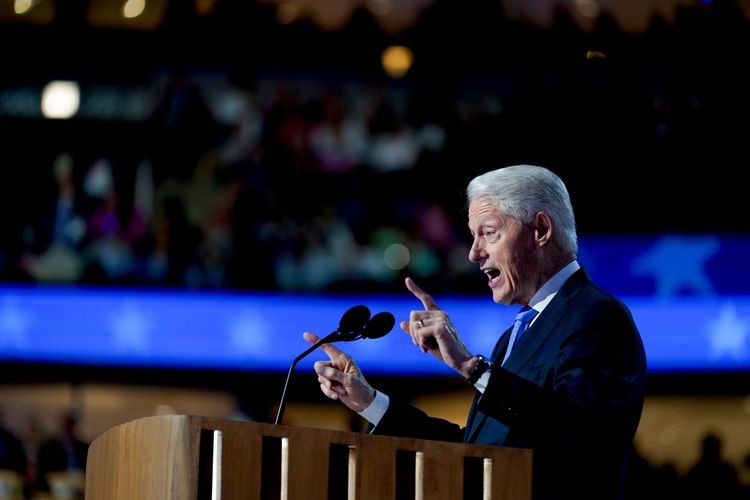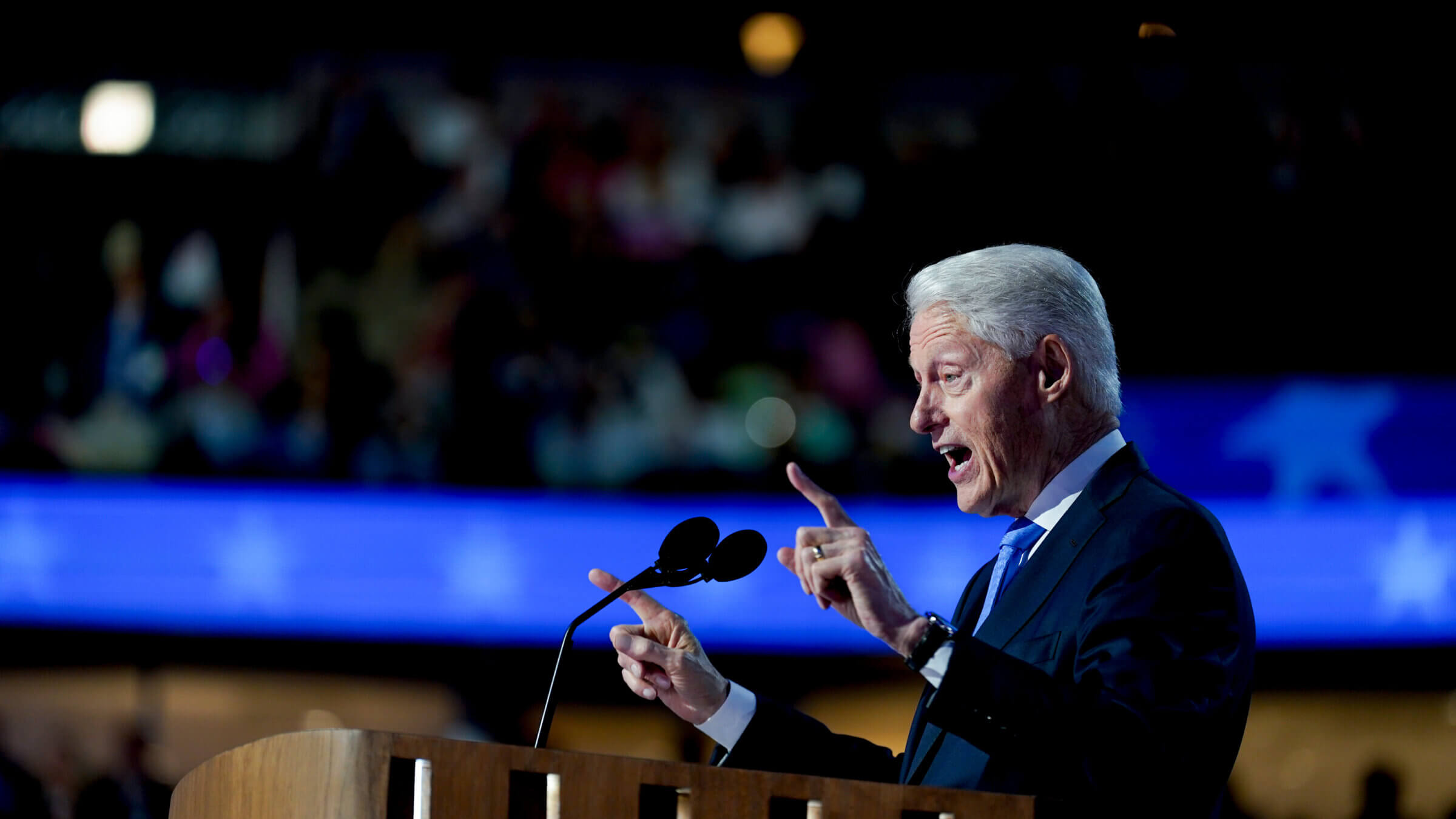What Jews and Bill Clinton talk about when they talk about ‘class’

Bill Clinton giving a speech at the Democratic National Convention. Photo taken by Getty Images.
Written by Aviya Kushner on August 22, 2024

During the recent Democratic National Convention speeches, former President Bill Clinton expressed his gratitude towards Biden for his bravery, elegance, dedication, and selflessness. It is uncommon to hear a politician being praised for their classiness, making it a standout moment among the other speakers.
During the DNC, "class" typically means a person's financial status.
Right on time, just a few minutes later, poet Amanda Gorman talked about Americans "no matter their beliefs, social status, or race." Tim Walz, a former teacher and the Vice Presidential nominee, repeated the phrase "middle class" throughout his speech, as if it held special significance.
"If you belong to a family in the middle-income range, or a family working towards achieving middle-class status, Kamala Harris plans to lower your taxes," Walz stated. It's interesting to note that the term "class" is used twice in this statement.
In the Merriam-Webster dictionary, there are different meanings for the word "class", but in the Jewish community, ideas about class can be deceptive. With the upcoming presidential election causing concern among many Jews, it is important to recognize that Jews come from various economic backgrounds, and there is a range of social classes within the Jewish community, including those experiencing poverty.
As per the UJA Federation of New York, about one-quarter of adults in Jewish homes in NY were living in poverty or close to it, while nearly one-tenth of Jewish adults with kids were facing food insecurity.
In Chicago, where the convention is taking place, a study conducted by Brandeis University found that 20% of households are having difficulty with their finances. These households either said they are not able to cover all their expenses or they are just barely managing to do so. Among the Jewish households in this situation, 59% mentioned that their financial situation had deteriorated since the pandemic began.
The topic of social class is not commonly brought up at Jewish events, where discussions about wealth and status are usually avoided. People may automatically assume that everyone present belongs to at least the middle class. However, looking up the definition of "class" can help us understand why this topic is often avoided and causes discomfort.
Merriam-Webster's primary meaning of "class" is likely common to Walz, who is a teacher: "a group of students coming together regularly to learn about the same topic." The second definition is "a group of people who have the same economic or social status." Another definition is "top quality" or "gracefulness", which is what Clinton was referring to - although the former president may have had in mind Webster's fifth definition, which is "the finest of its type".

Aside from the speeches, the convention also included videos showcasing regular people, such as a construction worker who was let down by Trump's unfulfilled infrastructure promises. The videos seemed to target white working-class voters and had no apparent connection to Jewish people, but the focus on class may have caused some unease in a year marked by widespread discomfort. Associating class and Jews risks perpetuating harmful stereotypes about Jews and wealth.
It is also connected to attitudes towards Jewish people and ethnicity.
In simpler terms, Annie Jollymoore from Rosov Consulting stated that Jewish identity is often linked to wealth and social status. She shared this perspective in eJewish Philanthropy and also referenced her article in the Forward. Rosov Consulting works with donors and recipients to enhance Jewish education and involvement.
In the end, this can lead to a situation where we struggle to recognize Jews who don't match our preconceived ideas of what a Jew should be. This includes their appearance, language, mannerisms, diet, style of dress, mindset, occupation, religious practices, knowledge of Jewish texts and history, connection to Hebrew or Israel.
Jollymoore added that class plays a role in shaping Jewish communities and their traits. It's important for Jewish communities to recognize how class influences Jewish life in the U.S., especially in organized Jewish settings, and who may be left out because of it.
In her blog post, Jollymoore talked about her research project that uncovered the common stereotypes and beliefs people have about Jews and social class. She shared a story about a gathering for interfaith couples where a man assumed that the lawyer in a pair was Jewish, only to discover that it was actually the police officer who practiced the Jewish faith. This incident challenged his preconceived notions and highlighted the importance of not jumping to conclusions based on superficial traits.
She pointed out that the speed of making assumptions and the shock of being proven wrong show that there is a social aspect to Jewish identity. Those who do not belong to this social group may find it harder to be acknowledged as Jews by others.
The idea of acknowledgment really resonated with me. The Democratic convention is all about Democrats identifying and acknowledging themselves as Democrats, while also inviting Republicans and independent voters to join in.
The Jewish community should use this chance to realize that Jews come from various economic backgrounds and work in a wide range of professions. It is important to understand that not all Jews fit into the stereotype of working in specific professions or having a certain financial status.
While I was listening to the different presenters, I couldn't help but notice that all the discussions about the "middle class" completely left out the impoverished individuals. These speeches do not address the concerns of nearly a quarter of American Jews who are facing difficulties in fulfilling their basic necessities, according to surveys.
And of course, the middle class is a vast landscape, and there are many Jews who do not belong to the upper-middle-class.
Recognizing this fact and treating it with consideration is the type of behavior Clinton mentioned when complimenting the president.
Biden, who decided not to seek re-election, may be most notable for his recognition of a challenging truth. Jews examining America and their role in it can use this chance to honestly assess their surroundings and do the same.
Aviya Kushner writes about language for the Forward and has written books called Wolf Lamb Bomb and The Grammar of God. You can find her on Twitter at @AviyaKushner.
CEO Rachel Fishman Feddersen's Message
I hope you enjoyed reading this post. Before you leave, I would like to request you to kindly help support the Forward's exceptional, non-profit journalism during this crucial period.
In today's world, American Jews require unbiased news sources they can rely on, with reporting based on facts rather than opinions. Our focus is on serving you without being influenced by any specific agenda.
In a time when many other news organizations are shutting down or reducing their operations, the Forward has decided to make its content free to access and has dedicated more resources to covering stories in Israel and across the United States. They are focused on reporting firsthand on the effects of the war, the increase in antisemitism, and the demonstrations happening on college campuses.
Our readers play a crucial role in helping us continue our work. Join our Forward Membership to stay connected with our journalism and your local community.
- Rachel Fishman Feddersen, Chief Executive Officer and Publisher













































